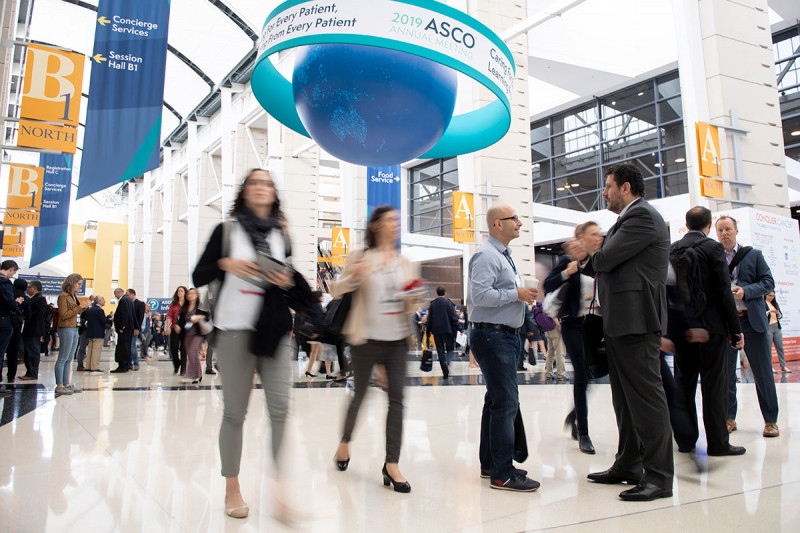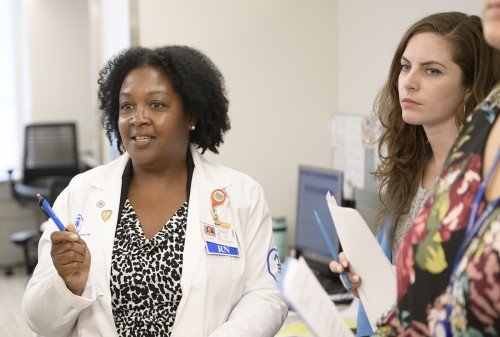
Each year in Chicago, tens of thousands of doctors, nurses, and researchers meet to discuss the latest in cancer research and ways to treat the disease at the annual meeting of the American Society of Clinical Oncology (ASCO). The theme this year is “Caring for every patient, learning from every patient.”
Among the high-profile studies that involved Memorial Sloan Kettering researchers were:
- a study showing that a targeted therapy did not increase survival when compared with chemotherapy for the treatment of people with soft-tissue sarcoma
- a trial testing a PARP inhibitor for the treatment of people with pancreatic cancer who had an inherited BRCA gene mutation
Here is a look at some other key findings:
HER2-Targeting Drugs Could Be a Fruitful Strategy against Salivary Gland Tumors
On May 31, MSK medical oncologist Bob Li presented promising results from a phase II basket trial that included a group of patients with salivary gland cancer.
There is no approved treatment for these rare tumors once they have spread. But there is promise for a small fraction of them — less than 10% — that make abundant quantities of a protein called HER2. Drugs are already approved to treat HER2-positive breast cancers, so this finding opens up new possibilities for treatment in salivary gland tumors. Dr. Li and his colleagues suspected that people with these HER2-amplified salivary gland tumors might respond well to a HER2-targeted drug called ado-trastuzumab emtansine (Kadcyla®). This drug consists of a HER2-targeted antibody linked to a cancer-killing toxin. Known as an antibody drug conjugate, the drug seeks out cells with amplified HER2. It then enters the cancer cells to deliver its toxin while sparing normal cells. The investigators enrolled ten people with HER2-amplified salivary gland cancer in the study.
Nine out of the ten patients (90%) who were treated with the drug saw their tumors shrink. Five of these people had a complete response, meaning they had no measurable disease after the treatment. Even people who had received several prior therapies, including HER2-targeted drugs, responded to ado-trastuzumab emtansine. There were no serious side effects. The study authors conclude that ado-trastuzumab emtansine is “highly efficacious” in people with HER2-amplified salivary gland cancer and say that a larger group should be studied to confirm the results.
“This study is a great example of precision medicine, with nearly all of the patients with this rare tumor benefiting,” Dr. Li says. “The challenge is to find people with HER2-amplified salivary gland tumors. We hope to get the message out to the medical community that there is hope for these patients, and active participation in a clinical trial may be lifesaving.”
Evaluating Treatments for Early-Stage Triple-Negative Breast Cancer
During another session at ASCO on breast cancer, researchers presented findings from a phase II trial of two treatments for early-stage triple negative breast cancer (TNBC). The study looked at how a biomarker of DNA-damage repair correlated with response to two chemotherapy drugs — paclitaxel and cisplatin — when used before surgery to shrink tumors.
MSK breast medical oncologist Tiffany Traina was one of the authors on the study. Dr. Traina explains that previous studies of TNBC have suggested that platinum chemotherapy (like cisplatin) may work better than taxane chemotherapy (like paclitaxel) in people with advanced disease who have inherited BRCA mutations. Yet this difference in benefit is less clear for early stage TNBC. Furthermore, the role of platinum drugs in TNBCs not related to inherited BRCA mutations remains uncertain. The researchers wanted to find out if a particular biomarker could identify TNBCs that respond to platinum drugs, even if patients do not have an inherited BRCA mutation.
The study used a specific commercial test to evaluate homologous recombination deficiency (HRD) as a biomarker to predict which tumors may respond better to chemotherapy. The researchers also wanted to see if the HRD assay predicted greater benefit from platinum chemotherapy than taxane chemotherapy.
The study participants were randomized to receive either cisplatin or paclitaxel for 12 weeks before surgery. About 70% of the tumors tested were considered HRD “positive.” Their doctors then measured the tumors’ response at the time of surgery. HRD positivity did not predict a significantly greater benefit from cisplatinum. Both chemotherapy drugs had similar activity with a response rate of about 25%.
“Based on these findings, this particular HRD assay cannot be used to choose one chemotherapy over another for patients with early-stage TNBC. Taxane-based chemotherapy remains the foundation of curative therapy for these patients,” Dr. Traina says. “However, it’s possible that these results are a reflection of the biomarker and not the concept of HRD for predicting benefit. This study’s great strength stems from the collection of biospecimens for continued biomarker investigation.”
Lowering Breast Cancer Deaths through a Low-Fat Diet
Research conducted at MSK and elsewhere has firmly established the link between excess fat and breast cancer. A major new study presented at ASCO provides the first randomized clinical trial evidence that diet can reduce postmenopausal women’s risk of dying from breast cancer.
The research was led by Rowan Chlebowski of the Los Angeles Biomedical Research Institute. The study followed nearly 50,000 postmenopausal women from 1993 to 1998. The participants had no history of breast cancer when they enrolled in the study. Women from 40 clinical centers across the United States were randomly assigned to follow one of two diets. In one diet, fat accounted for 32 percent of daily calories on average. This was the women’s usual diet. In the other diet, fat intake was reduced to 20 percent of calories, and consumption of vegetables, grains, and fruits was increased.
MSK medical oncologist Neil Iyengar, who studies the link between breast cancer and diet and was not involved in this research, says, “This is the first study to show that dietary modification can reduce the risk of breast cancer related death, and it did so by approximately 20%.
“These findings are particularly important because the diet is straightforward,” he continues. The diet used in the study is similar to one called DASH, which is designed to treat high blood pressure.
“Even with a modest weight loss of 3% on average, the benefit was apparent and offers an immediately actionable lifestyle change for millions of women,” says Dr. Iyengar. He cautions, however, that this specific eating plan may not be ideal for everyone, since people react differently to diets.
Caring for People with Central Nervous System Diseases
People with a brain tumor or another central nervous system (CNS) disease often face cognitive and physical issues. In conjunction with the ASCO meeting, two MSK teams published research that addresses how these patients’ needs are met and where there is room for improvement.
In one study, a team led by Ugur Sener, a clinical fellow in the lab of Adrienne Boire, aimed to understand how patients and their families used ethics consultations at MSK. The study looked at 50 patients who had a primary or metastatic CNS tumor or other CNS disease. Louis Voigt, Chair of MSK’s Ethics Committee, and neurologists Eli Diamond and Alan Carver were also involved in the research.
The most common ethical issues addressed in these consultations involved decision-making by a healthcare proxy and do-not-resuscitate orders. Other issues included conflicts within families, conflicts between staff and family, and cultural or religious considerations.
“Neurologic illnesses can be profoundly disabling and cause a loss of self,” says Dr. Sener. “Caring for these people is about much more than just treating the tumor with surgery, radiation, and chemotherapy.”

In another study, an MSK team set out to create a new model of care for patients with complex CNS cancers. The Neurological Multidisciplinary Care Clinic (MdCC) was established in August 2017 to make medical care easier for patients. At the MdCC, patients can see many specialists in a single day, rather than travel from one appointment to another over several days. In a three-hour visit to the clinic, a patient and caregiver could see a neurologist, nurse, physiatrist, physical therapist, social worker, case manager, dietitian, and chaplain.
“People who have been diagnosed with a brain tumor need special attention and care,” says neuro-oncologist Elena Pentsova, who started the MdCC along with physiatrist Lisa Ruppert and anesthesiologist Kara Barnett. “We’ve found in this pilot study that it’s really effective to bring together many doctors, nurses, and other experts into one room to focus on one patient at a time.”
The study found that 97% of patients received recommendations to manage their symptoms, 92% discussed prognosis and coping, physical therapy orders were newly given or updated for 61%, and new orthotics or physical therapy equipment were prescribed for 10%.
“The presence of these experts at the time of a clinic visit allows for real-time assessment of the patient and their caregivers and support system, team collaboration, planning and coordination of community services, and implementation of a safe and patient-centered plan of care,” says Dr. Pentsova.




